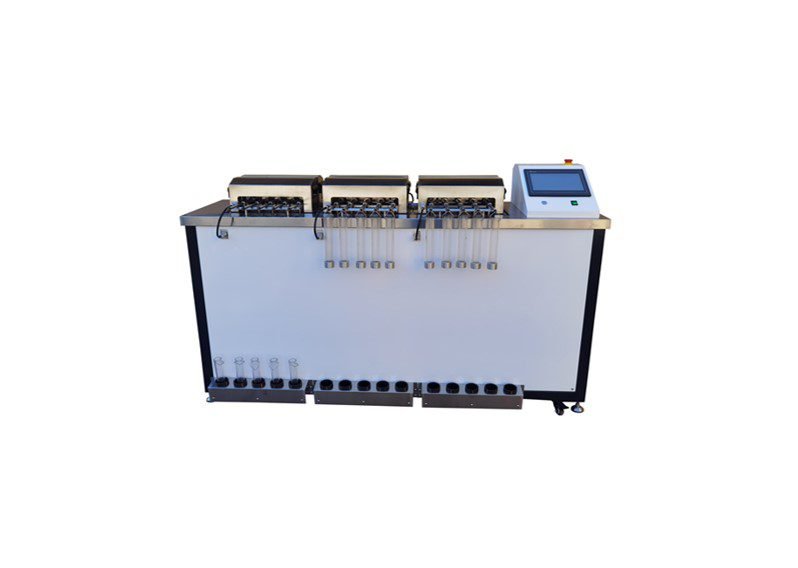Introduction to the Notched Constant Ligament Stress (NCLS) Tester
In the world of materials testing, the Notched Constant Ligament Stress (NCLS) tester is a vital tool for assessing the susceptibility of HDPE (High-Density Polyethylene) resins and corrugated pipes to slow crack growth under constant ligament stress in an accelerating environment. This innovative testing method enables engineers and researchers to evaluate the performance and durability of these materials, which are commonly used in applications such as water distribution, drainage systems, and gas transmission.
Why Testing for Slow Crack Growth is Crucial ?
HDPE resins and corrugated pipes are essential components in modern infrastructure, providing efficient and reliable solutions for various civil engineering and environmental applications. However, these materials are susceptible to slow crack growth, particularly in aggressive environments, which can compromise their long-term performance and structural integrity. Therefore, it is crucial to subject them to rigorous testing to assess their resistance to slow crack growth and ensure their reliability in real-world conditions.
How the TESTRON TT-NCLS Notched Constant Ligament Stress Tester Works
TESTRON TT-NCLS Notched Constant Ligament Stress Tester offers a comprehensive approach to evaluating the slow crack growth behavior of HDPE resins, corrugated pipes, and pipe testing equipment. By subjecting these materials to a constant ligament stress in an accelerating environment, the tester simulates the conditions that can lead to crack initiation and propagation, providing critical insights into their long-term durability and performance. The equipment complies with ASTM 5397 and ASTM F2136.
Principle of the NCLS Testing Method
The fundamental principle behind the NCLS testing method lies in the application of a constant ligament stress to a notched specimen, which is then exposed to an accelerating environment, such as elevated temperature or aggressive chemical solutions. This combination of stress and environmental factors is designed to replicate the real-world conditions that can induce slow crack growth in HDPE resins and corrugated pipes, allowing researchers to assess their resistance to this phenomenon.
During the testing process, the NCLS tester continuously measures the strain and crack propagation in the specimen, providing valuable data on the material’s response to the applied stress and environmental factors. By analyzing the initiation and progression of cracks under controlled conditions, researchers can ascertain the critical stress intensity factor (KIc) and the critical environmental stress cracking resistance (ESCR) of the material, which are essential parameters for predicting its long-term performance in service.
Data Collection and Analysis During the Testing Process
The versatility of the NCLS tester enables researchers to investigate various parameters that influence slow crack growth in HDPE resins and corrugated pipes. This includes studying the effects of different environmental factors, stress levels, notch geometry, and material properties on the material’s resistance to crack initiation and propagation. Furthermore, the tester can be used to compare the performance of different grades of HDPE resins and corrugated pipes, allowing for an informed selection of materials based on their slow crack growth behavior.
Applications of NCLS Testing in HDPE Resin and Corrugated Pipe Development
The data obtained from NCLS testing plays a crucial role in the development and improvement of HDPE resins and corrugated pipes, enabling manufacturers to optimize their formulations and designs for enhanced resistance to slow crack growth. Additionally, this testing method provides valuable insights for engineers and infrastructure developers, aiding in the selection of materials that can withstand the challenges of aggressive environments and prolonged service life.
Moreover, the NCLS testing method is instrumental in validating the compliance of HDPE resins and corrugated pipes with industry standards and regulations. By demonstrating the material’s performance under accelerated slow crack growth conditions, manufacturers can ensure that their products meet the required quality and durability criteria, thereby instilling confidence in their usage for critical infrastructure applications.
Conclusion
In conclusion, TESTRON TT-NCLS Notched Constant Ligament Stress tester represents a significant advancement in the assessment of HDPE resins and corrugated pipes’ susceptibility to slow crack growth. By subjecting these materials to controlled stress and environmental conditions, the NCLS testing method provides essential data for evaluating their long-term performance and durability. As the demand for reliable and durable infrastructure solutions continues to grow, the insights obtained from NCLS testing will play a pivotal role in advancing the development and application of HDPE resins and corrugated pipes in a wide range of civil engineering and environmental projects. For more information and inquiry please get in touch with info@testrongroup.com


